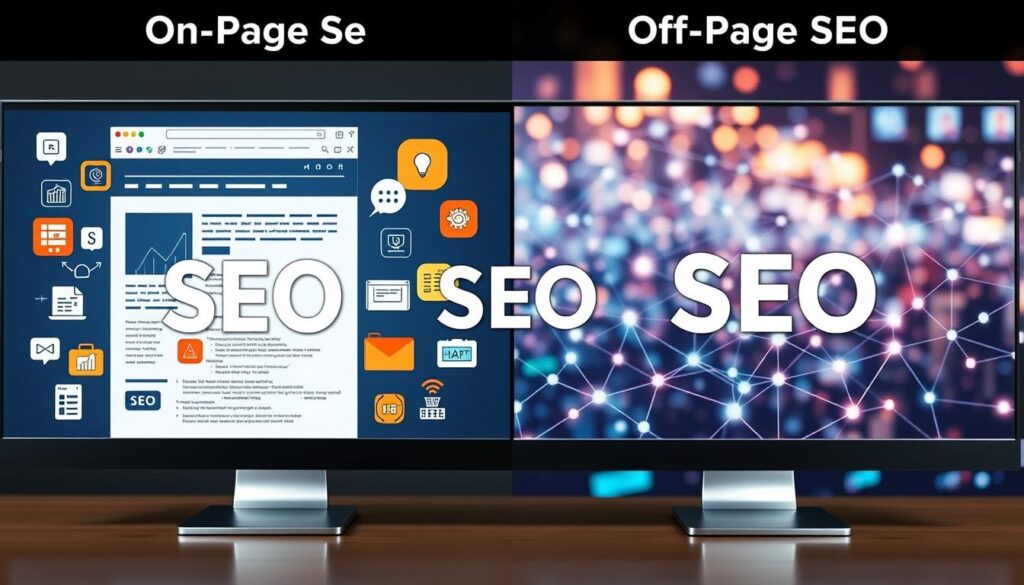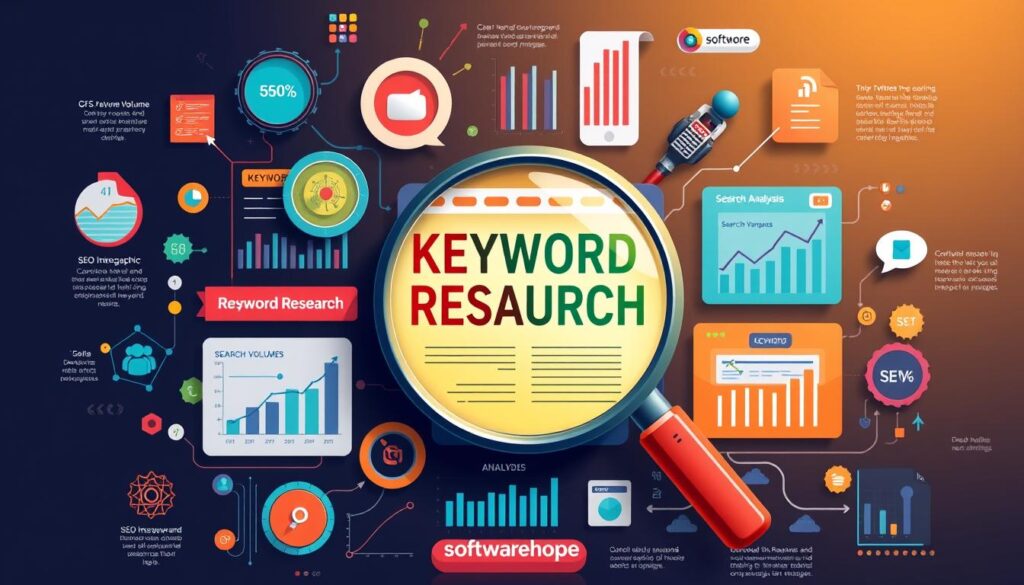Ever wondered why some websites always show up first in search results? It’s like they’re part of an exclusive club. This club is called search engine optimization (SEO). SEO mixes art, science, and patience to help you get more organic traffic. It’s about matching your site with what people are searching for.
Did you know the top search result gets 10 times more clicks than the tenth one? This shows how important it is to rank high in search results. Being at the top means your site can answer people’s questions first. Since most users pick organic results over ads, getting good at SEO can make your site more visible.
SEO isn’t just for one search engine. It works across all search engines. From Google to Bing, making your site SEO-friendly means being a trusted source. This means your site meets people’s needs whether they want to learn, shop, or explore.
Understanding SEO lets you show off your site’s expertise and trustworthiness. In today’s digital world, making your site fast, secure, and mobile-friendly is key. It’s not just a strategy; it’s essential for a good online experience.
Key Takeaways
SEO improves your search visibility and increases organic traffic.
Higher rankings boost click-through rates significantly.
The top result gets the most clicks.
Content that matches search intent boosts authority and SEO.
Factors like mobile-friendliness and page speed enhance rankings and user experience.
Staying updated on SEO practices, such as using structured data and meta tags, is crucial for competitiveness.
Understanding the Basics of Search Engine Optimization (SEO)
Search Engine Optimization (SEO) is crucial for boosting a website’s ranking on Google . Google uses complex algorithms to showcase the best content . As the leading search engine, it drives the most web traffic. Google frequently updates its algorithms to ensure top results . The processes of crawling and indexing allow Google to evaluate web pages.
Your site must be optimized for technical SEO. This ensures search engines can easily find and list your content . It also enhances the user experience . Google considers factors like user engagement and site speed for rankings .
Keywords are very important. Each page should match the keywords that fit your business and draw in your audience. Sites like Moz and Google offer great help. They explain how search engines work and how to meet their needs.
A good SEO plan helps increase visibility and keep it up. SEMrush says that good SEO can keep your rankings steady over time. This makes SEO a better choice for the long run than paid ads. They bring organic, unpaid traffic to your site. It’s more likely to engage with your content and become customers.
Why Use Search Engine Optimization (SEO)?
Adding SEO to your digital marketing plans does more than just make you more visible. It boosts your ability to bring a lot of organic traffic directly to your site. Why is this important ? Well, organic search brings in about 53% of all website visits. With the global SEO market expected to reach 2.11 billion by 2028, not using SEO means you’re leaving a big part of the market behind.

SEO isn’t a quick fix; it takes time and steady work. Some SEO changes might work fast, while others could take months to really make a difference in your rankings. But the hard work pays off, as a top-ranked website is seen as trustworthy, boosting your brand’s image .
When looking at marketing strategies, SEO offers key insights . It helps you understand how people start looking for products, with 49% using search engines like Google. It also shows what kind of content grabs users’ attention.Plus, making your content engaging and unique helps your site stand out in search results .
SEO improves all aspects of digital marketing .It boosts visitors, sales, and desired actions. Moreover, SEO isn’t just about ranking high in search results. It’s about connecting with your audience at various times .This approach increases the chances of them becoming loyal customers .
The Importance of SEO in Digital Marketing
In today’s digital world, SEO is key to digital marketing. It boosts organic search traffic and ensures a high return on investment. SEO makes businesses stand out and gives them a competitive edge needed for success.
Why Organic Traffic Matters
Organic search traffic is crucial for digital marketing. It brings in more engaged visitors and boosts the chance of turning them into customers. With good SEO, websites get better user experiences and fewer people leave quickly.
lso, being at the top of search results means more leads. It helps your business grow over time.
Gaining a Competitive Edge
Using on-page SEO, like making content better with keywords and headings, helps a lot. Off-Efforts to gain reliable backlinks boost a website’s search ranking. Increased online visibility, in turn, drives more traffic and enhances a brand’s credibility .
A strong SEO strategy means you’re seen in crowded digital markets. The competition is tough, but being at the top brings big rewards .
Diving Into On-Page vs. Off-Page SEO
Learning about SEO can be easy. First, understand on-page and off-page optimization. This knowledge boosts your website’s visibility in search results.
The Significance of On-Page Optimization
On-page optimization is about making your website’s content top-notch. It means using keywords to connect with what users are searching for . This approach is backed by content that matters and ranks well on search engines .
Make your multimedia engaging and your page fast. Also, use schema markup and ensure your site is mobile-friendly for better SEO .
Building Authority with Off-Page Techniques
Off-page SEO looks at what’s outside your site to build your authority. Getting backlinks from trusted sites is a big deal for search engines. Also, good reviews on Google My Business can boost your SEO by showing you’re trustworthy .
Local SEO is great if you have a physical location. It helps you show up in Google’s Local Pack, bringing in targeted traffic .
| SEO Aspect | On-Page | Off-Page |
|---|---|---|
| Core Focus | Content quality, keyword use, multimedia and slug optimization, page speed, mobile-friendliness | Backlinks, online reviews, local SEO |
| Benefits | Improves individual page ranking and user experience | Increases overall site authority and reputation |
| Key Tools | Schema markup, SEO-friendly content management systems | Link building strategies, local business listings |

Knowing how on-page and off-page SEO work can change the game for your SEO strategy. By improving your site and building its reputation, you’re setting up for long-term digital success.
Keyword Research: The Foundation of SEO Strategy
Starting an SEO journey begins with keyword research. It’s the base of a strong SEO plan. By digging deep, you find the right keywords. They are what people use to search for things related to your business.

Identifying Your Target Keywords
Finding your target keywords means knowing what your audience searches for. Tools like Google Trends and Ubersuggest show keyword popularity and demand. This helps you create content that engages your audience, boosting your site’s visibility and traffic.
Tools and Techniques for Effective Keyword Analysis
For great keyword research, you need the right tools and methods. SEMrush and Ahrefs give detailed info on search volume and competition. This helps make a focused SEO strategy. It’s also key to know why people search for certain keywords. This makes sure your content meets their needs, which boosts engagement
Keyword research is crucial. For example, a small online bookstore increased its organic traffic by 150% by targeting specific keywords. As a result, its sales doubled in just six months. This shows how important it is to include keyword research in your SEO plan.
| SEO Metric | Importance | Tool for Analysis |
|---|---|---|
| Search Volume | Shows how popular and how much traffic a keyword can bring | Google Analytics, SEMrush |
| Competition | Tells you how hard it is to rank for keywords | Ahrefs, Ubersuggest |
| Keyword Difficulty | Shows how tough it is to compete on certain terms | SEMrush, BuzzSumo |
| Relevance | Makes sure keywords match what your audience is interested in | Google Trends, SEMrush |
Focusing on these metrics boosts your site’s SEO and attracts targeted traffic. The aim of keyword research is to draw in visitors truly interested in your offerings.
Optimizing Content to Meet Search Intent
When creating content, focus on the right keywords and match it to your audience’s needs. This ensures you attract visitors and effectively address their questions.

Understanding the four main search intents—informational, navigational, transactional, and commercial—is vital. Each requires a unique strategy to connect with users.
Informational intent seeks answers or information. So, detailed, trustworthy content is key. For quick voice search answers, focus on long-tail keywords.
Navigational intent is about knowing what to find. Make the process easy.
Transactional intent involves buying or acting. Thus, content should be persuasive and straightforward.
Commercial intent is about comparing options. Provide top-notch reviews and comparisons.
Adapting to these intents boosts content relevance and engagement. Tools like Semrush and Ahrefs are great for keyword discovery and planning.
AI can identify search intents, helping target keywords and user needs. Analyzing SERP features, like ‘People Also Ask’, offers insights into user demands. This leads to content that meets expectations, improving performance and satisfaction.
The Technical Side of SEO: Ensuring a Seamless User Experience
Technical SEO and user experience optimization work together to make a website better. They help improve how the site ranks and meets user needs. Let’s look at how combining technical updates and user-focused design can make your website better.
Speed and Performance Optimization
Page speed is key in technical SEO. It affects how your site ranks on search engines. Studies show that fast loading is crucial for good UX. The first content must load in 100 milliseconds and everything else in 2.5 seconds.
Fast loading times help with SEO and keep visitors interested. It also means they’re less likely to leave your site. Also, a faster site can improve your search ranking. It will help users find you.
Mobile Responsiveness and Accessibility

With more people using mobile devices, having a responsive site is essential. It’s not just a nice feature, but a must-have for good user experience and accessibility.
Mobile-first indexing is now common. So, your site must perform well on mobile devices to rank well and satisfy users.
Responsive design caters to all users and works across devices. It ensures your site remains consistent and stable.
Improving user experience means making your site easy to navigate. This helps search engines crawl and index your site better. Combining technical SEO with UX design makes your website better in many ways. It improves looks, engagement, and helps with visibility and user interaction.
Learn how to link SEO and UX goals for better website performance. Check out detailed insights on the intersection of SEO and user experience (UX).
Search Engine Optimization (SEO) Through Quality Backlinks
Backlinks are key to boosting your website’s visibility and trust. They come from high-authority sites and help your site rank better in search results. This makes your site more credible and raises its domain authority.
Using smart tactics like guest blogging and shareable content can boost your backlinks. However, prioritize quality over quantity. Google prefers sites with diverse backlinks.
Another good way to get quality backlinks is through broken link building. This means fixing broken links on other sites with your own links. Also, updating old content with links to your new, relevant content can help a lot.

In backlinks, quality is better than quantity. One great link is worth a thousand poor ones. It boosts rankings more. Strong internal links improve site indexing and navigation. This pleases search engines and visitors. Together, these strategies enhance search performance and user experience..
| Strategy | Description | Impact |
|---|---|---|
| Guest Blogging | Writing posts for relevant, high-authority websites | Increases domain authority and diversifies backlink profile |
| Broken Link Building | Replacing non-functioning links with relevant live links | Improves link juice and helps in acquiring new backlinks |
| Internal Linking | Linking internally across your website’s pages | Boosts site readability for search engines, enhances user experience |
| Content Marketing | Creating valuable, shareable content | Attracts natural backlinks, increases engagement and visibility |
Link building should create a varied, natural backlink portfolio. It must also follow SEO best practices. Focus on high-quality backlinks. This boosts your site’s authority and meets key ranking factors. As a result, your search engine rankings will improve.
Role of Meta Tags and Structured Data in SEO
Using meta tags and structured data is vital. They boost your site’s visibility and search engine rankings. Understanding how to use these elements effectively can significantly boost your website’s performance.
Meta Descriptions and Their Impact on CTR
Meta descriptions are vital in SEO as they’re often the first thing people see in search results. A A catchy meta description can boost your click-through rate (CTR). This will bring more visitors to your site. The summaries should grab readers’ attention and make them want to learn more.
Good meta descriptions can boost organic traffic and attract customers.
Tools for Ongoing SEO Auditing
Regularly checking your SEO is vital. It ensures your meta tags and structured data function well. SEO auditing tools can identify problems that hurt your website’s performance. They also offer advice on what to improve.
Schema Markup for Enhanced Visibility
Using schema markup is a great way to make your site more visible in search results. This structured data helps search engines understand your website’s content better. It can lead to rich snippets in search results, making your pages stand out.
Rich snippets can give users more information and often increase the click-through rate. To use schema markup well, you need to know which data types work best.
| SEO Element | Purpose | Impact on SEO |
|---|---|---|
| Meta Tags | Provide essential information about a webpage to search engines | Improves visibility and webpage understanding |
| Schema Markup | Helps search engines understand the context of page content | Enhances visibility and can lead to rich snippets |
| SEO Auditing Tools | Analyze and monitor SEO performance | Identifies areas for improvement and ensures compliance with SEO best practices |

Advanced SEO strategies can improve your site’s ranking and engagement. So, optimize meta tags, use structured data, and regularly check SEO for success.
Tracking and Analyzing SEO Performance
As you explore digital marketing, knowing your SEO performance is key. It’s vital to track and analyze SEO results to make your strategies work better. The right tools and methods help with this.

Understanding SEO metrics is crucial for success. You can boost your strategies by tracking search rankings and key indicators. Tools like Google Analytics and Search Console offer detailed traffic and ranking data.
SEO Metrics for Success
Organic Traffic: It shows your site’s ability to attract visitors without ads. It reflects its relevance and user interest.
Keyword Rankings: This indicates your site’s position in search engines, directly affecting traffic.
Click-Through Rate (CTR): The top Google spot achieves a 31.7% CTR. Improve titles and meta descriptions to boost clicks.
Conversions: This measures how well your site turns visitors into leads or customers, highlighting SEO value.
Bounce Rate: A low bounce rate indicates engaging and relevant content, aiding in higher rankings.
Using these metrics to improve your site’s visibility and engagement is crucial. Analyzing SEO results regularly helps you refine your strategies for better results. Tools like Moz and SEMRush, starting at USD 99, provide detailed analyses to boost your SEO.
Discover powerful data recovery tools that help manage your digital assets well. This ensures your SEO tools work best even when there are technical issues.
Mastering SEO is not just about tracking. It’s about using data to make informed decisions. With ongoing and informed efforts, your site can climb the organic search rankings and stay there.
Conclusion
SEO is a key part of digital marketing that helps your website stand out and rank well on search engines. With over 25% of people clicking the first search result they see, it’s clear why being at the top matters. To succeed, improve your website’s content. Get strong backlinks. Also, ensure it works well for users.
But it’s not just about getting any visitors. You want people who are really interested in what you offer. Keyword research helps align your content with audience searches. This boosts your site’s relevance and usefulness, making it a top choice in search engines.
In closing, SEO boosts your online visibility. Use internal links and clear calls-to-action. Also, make your content easy to read. These strategies improve your website. You’ll lead in digital marketing.
FAQ
What is SEO and how can it optimize my website?
SEO stands for search engine optimization. It makes your website more visible when people search for things related to your business on search engines like Google. By making your site better, you aim to rank higher in search results. This brings more visitors to your site and helps attract potential customers.
What are the basic principles of SEO?
The basics of SEO focus on making your website better for search engines. This includes technical SEO to make sure your site is easy for search engines to read and rank. It also involves processes like crawling and indexing your content.
Why is SEO important in digital marketing?
SEO is key for getting more traffic and boosting your online presence. It helps you reach people for free through search engines. This gives you a strong return on investment compared to other marketing ways.
How does off-page SEO differ from on-page SEO?
On-page SEO makes your website better by improving content and using keywords. Off-page SEO focuses on actions outside your site, like getting backlinks, to make your site stronger and rank better.
How significant is keyword research for SEO?
Keyword research is very important for SEO. It helps find the terms and phrases your audience uses. Using these keywords in your content makes your site more likely to show up in search results and attract the right visitors.
What role does content have in meeting search intent?
Content is crucial for meeting what users are searching for. By making content that answers their questions and meets their needs, you can improve your site’s ranking and draw in more targeted traffic.
Why is technical SEO important?
Technical SEO makes sure your site loads quickly, works well on mobiles, and is easy to use. These things make for a better user experience and help search engines rank your site higher.
How do backlinks affect SEO?
Backlinks, or links from other sites to yours, tell search engines that your content is valuable. A strong backlink profile can boost your domain authority and rankings, bringing in more organic traffic.
What role do meta tags play in SEO?
Meta tags, especially meta descriptions, summarize your page’s content and can make users click on your site. Optimizing these tags can increase your click-through rate and help your SEO efforts.
How can I use tools to improve my SEO?
Tools are essential for checking and improving your SEO. They help you keep an eye on things like meta tags, structured data, and site performance. This keeps you in line with SEO best practices and helps you stay ranked well.
How do I track and analyze my SEO performance?
To track and analyze your SEO, look at search rankings, website traffic, engagement, and backlink quality. Tools like Google Analytics can show you how your SEO is doing and where you can get better.
🌟 Unleash the Digital Power with Devendra Gupta 🌟
🖥️ Tech Enthusiast |Software Reviewer| Blogging Expert | SEO Guru |
Web developer 📊
🔍I tested hundreds of Software and reviewed



